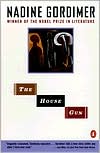

 |

|

Sold Out
Book Categories |
In 1994 South Africa's constitution was rewritten and free general elections were held for the first time in the nation's history. With Nelson Mandela's election as South Africa's first black president, the last vestiges of the apartheid system were finally eliminated.
This long-awaited freedom awaits social ratification from a population accustomed to defending itself along racial divides. Violence has shifted from the public to the private domain, and even the house gun, no longer needed for external protection, poses a new threat.
In the context of this transitional stage, Nadine Gordimer's book The House Gun explores with stark reality the reverberations of violence as it penetrates the affluent lives of Harald and Claudia Lindgard and their son, Duncan. Accused of murdering a friend, Duncan faces a trial that tests the smug certainties of the Lindgards' privileged life. Disbelief and guilt force a restructuring of their ethics and finally a redefinition of their relationship with each other.
While revealing the residual tensions of post-apartheid South Africa, Gordimer's observation of the sustaining forces of human relationships is universal.
Why do my eyes glaze over when I see the words "Nadine Gordimer"? Here's a brilliant and accomplished writer, internationally acclaimed -- Gordimer won the Nobel Prize in literature in 1991 -- on the right side of every social cause that matters and, moreover, female, with a woman's moral authority and a sensitivity to the shades and nuances of actual human experience. You'd think I'd be crazy about a writer like this, but I'm not. Gordimer bores me. She bores me silly.
I know -- I ought to be ashamed of myself. Gordimer's courageous opposition to apartheid in her native South Africa remains among the most inspiring stances on the modern literary record. Since April 1994, when South Africa held its first free elections in many years, she has turned her eye and her acute sensibilities to a variety of other ills and social injustices: the threat of nuclear proliferation; the problem of world poverty; the question of Jerusalem; the menace of AIDS. "In art begins responsibility," Gordimer says, "and with human responsibility, justice and peace have a chance." She is so right-minded I feel like a squeaky idiot for criticizing her at all. But having finished The House Gun, Gordimer's 12th novel, my pupils feel as if they've been dilated for an eye exam and my brain as if it's been rubbed with sandpaper.
The House Gun is the disquieting, discordant, hallucinatory tale of a well-to-do South African family -- an insurance executive, Harald, a doctor, Claudia, and their enigmatic son, Duncan -- whose lives fall apart when Duncan is accused of murder. Duncan is, in fact, guilty as hell, and it's Harald and Claudia's challenge to reconcile his deed with the son they raised and the love they feel for him. In the end, in spite of their own refinement and continuing privilege in post-apartheid South Africa, they must face the fact that Duncan is guilty and that believing in him, unfortunately, is not the same as believing a word he says.
So far as I can tell, that's all there is to it. "Out of something terrible, something new," Gordimer writes, "to be lived with in a different way, surely, than life was before?" Her text is willfully disjointed, dissociative and opaque, and it's peppered with questions, "He/She" ruminations, endless ambiguities and hyphens run amok in the European manner. It's all "writing," anyhow, tailor-made for the deconstructionists, among whom Gordimer is already a hero thanks to her well-known "distrust" of conventional narrative: " -- Unfortunately. Unfortunately -- I have to tell you, when he (a wide gesture) when he opens up, when he begins to co-operate with me -- that is when he and I will have to tackle what there is to face. -- " And later: "Duncan's manner stopped their mouths against any concern about how the ordeal under scrutiny among the schizophrenics and demented had passed." That sentence had me thinking some schizophrenic thoughts of my own, and left me not caring a hoot whether Duncan hanged or his parents adjusted or not. Doubtless I'm too superficial for a writer as important as this. But for my money, if you want Moral Dilemmas, read Muriel Spark, who deals with the same sort of subject with a light and heartless hand and whose own Nobel -- you heard it here first -- is way overdue. --SalonJan. 30, 1998
Login|Complaints|Blog|Games|Digital Media|Souls|Obituary|Contact Us|FAQ
CAN'T FIND WHAT YOU'RE LOOKING FOR? CLICK HERE!!! X
 You must be logged in to add to WishlistX
 This item is in your Wish ListX
 This item is in your CollectionThe House Gun
X
 This Item is in Your InventoryThe House Gun
X
 You must be logged in to review the productsX
 X
 X

Add The House Gun, , The House Gun to the inventory that you are selling on WonderClubX
 X

Add The House Gun, , The House Gun to your collection on WonderClub |